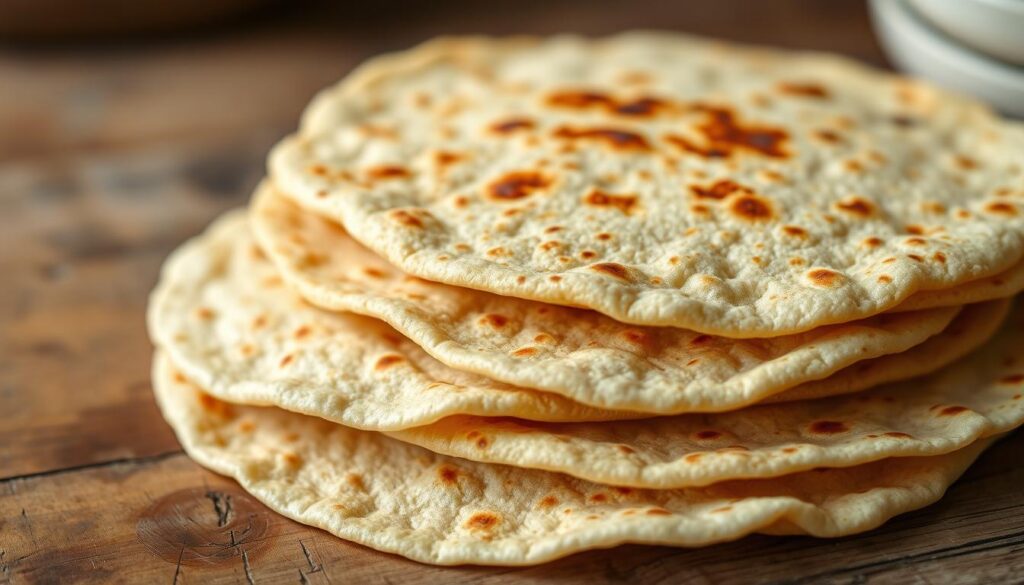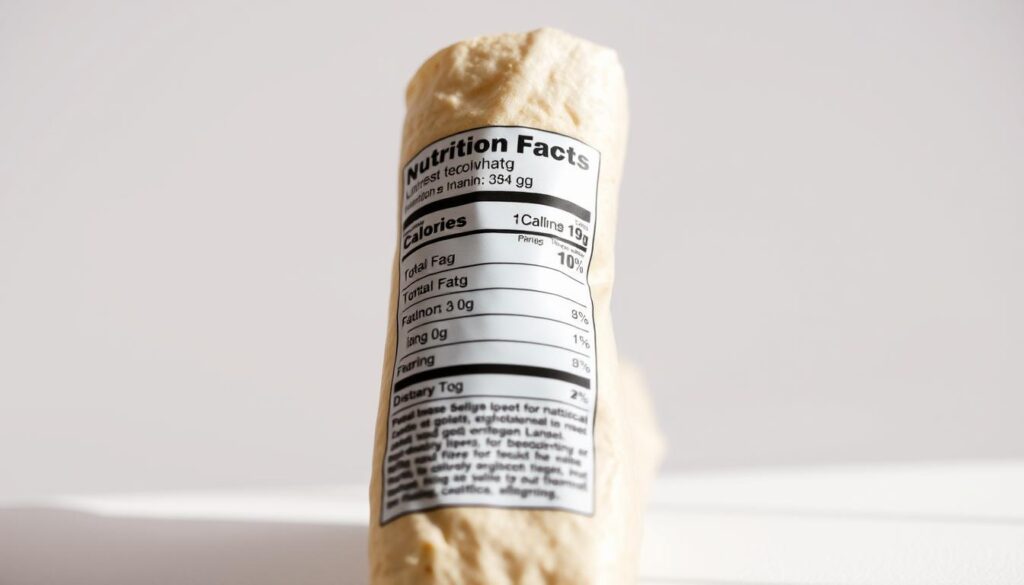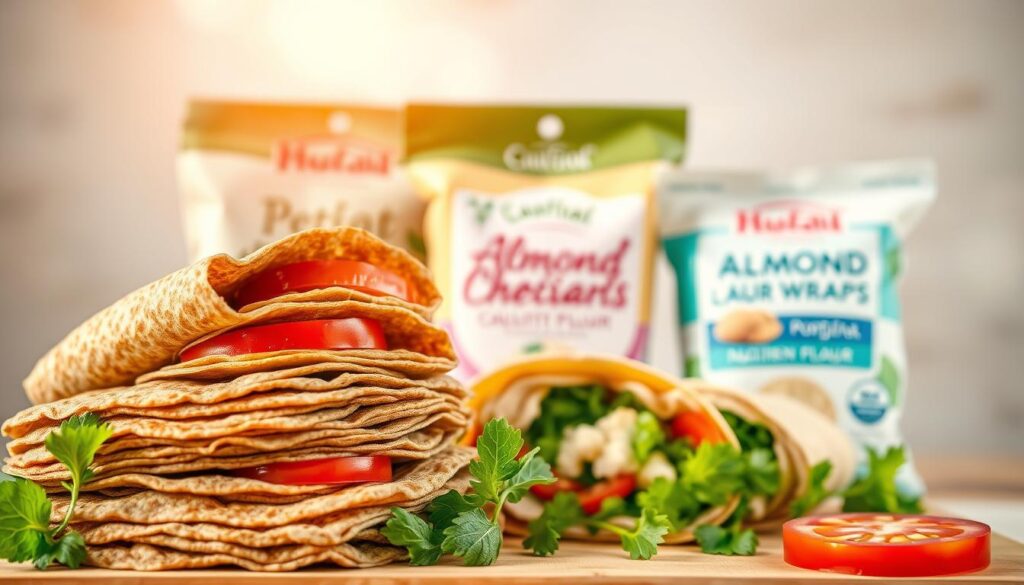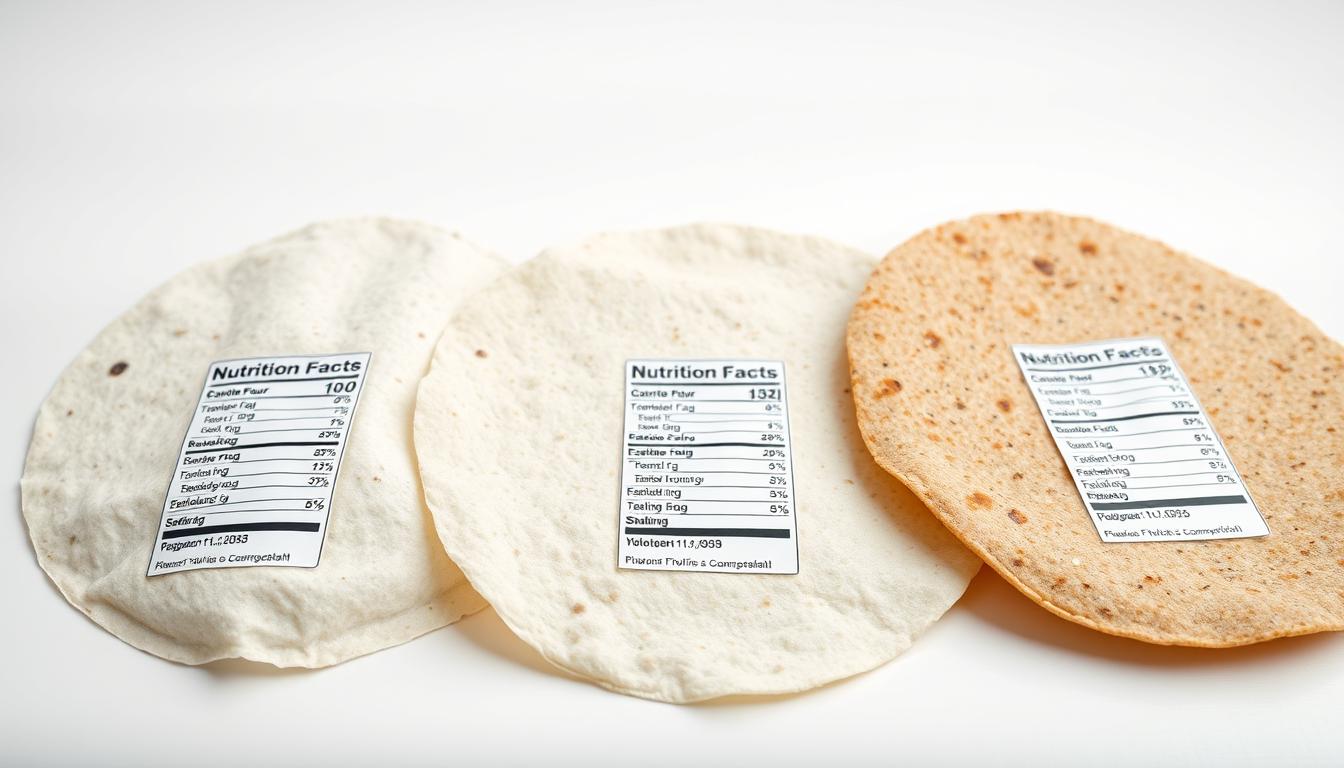Table of Contents
Imagine you’re getting ready for lunch, looking at the tortillas in your pantry. Do you pick flour, corn, or whole wheat? It’s not just about taste. It’s about what gives you energy for the day.
Whether you’re making lunch for work or dinner for the family, knowing tortilla wrap calories is key. It helps you make better choices.
Key Takeaways
- Flour, corn, and whole wheat tortillas vary widely in calories and nutrients.
- Knowing tortilla wrap calorie count helps balance meals without sacrificing flavor.
- Traditional and modern uses of tortillas fit into both casual and health-focused diets.
- Size and preparation methods directly affect calorie content and nutritional value.
- Simple swaps—like choosing whole wheat over flour—can boost fiber and cut empty carbs.
Tortillas are more than just a wrap for your food. They’re a key part of many meals. This article compares the calories of each type. So, you can enjoy them without worrying about the calories.
Let’s explore the numbers and how to make every bite count.
Understanding Tortilla Wraps in American Cuisine
Tortilla wraps have become a big part of American food. They started as street food and now are on dinner tables. This change shows how our eating habits have shifted towards easy and mixed foods.
The Rising Popularity of Tortillas in the US
USDA data shows that tortillas sell over $10 billion a year. Eighty-five percent of homes buy them every month. Brands like Mission and La Tortilla Factory are everywhere, offering many types like organic and gluten-free.
Common Uses for Tortilla Wraps
- Breakfast: Breakfast burritos with eggs and spinach
- Lunch: Chicken salad wraps for quick meals
- Dinner: Stuffed enchiladas as a family-friendly dish
When picking tortillas, you can choose between corn and whole wheat. This lets you balance tortilla wrap nutritional value with taste.
Traditional vs. Modern Tortilla Variations
| Aspect | Traditional Methods | Modern Methods |
|---|---|---|
| Preparation | Stone-ground corn, nixtamalization | Industrial milling, added preservatives |
| Ingredients | Corn, lime, water | Flour blends, oils, stabilizers |
| Texture | Crunchy, subtle corn flavor | Soft, longer shelf life |
| Nutritional Impact | Higher fiber, no additives | Lower fiber, potential preservatives |
Knowing these differences helps you pick tortillas that fit your tortilla wrap health information needs. While modern wraps are easy to use, traditional ones might be healthier.
Calories of Tortilla Wrap: A Comprehensive Breakdown
Choosing tortilla wraps? Knowing their calories is crucial. Let’s dive into the numbers to help you decide.
Average Calorie Content by Size
- 6″ tortilla: 60–80 calories
- 8″ tortilla: 100–120 calories
- 10″ tortilla: 150–180 calories
- 12″+ jumbo wraps: 200+ calories
Size is important. Bigger wraps have more calories. So, pick smaller ones if you’re watching your calorie intake.
How Processing Affects Calorie Count
Processing changes the calorie count of tortilla wraps. Mass-produced wraps often have added oils, sugars, or preservatives. This increases their calories. On the other hand, fresh, additive-free wraps have fewer calories.
Baking or frying also affects calories. Fried tortillas can have 30–50 extra calories from oil.
Store-Bought vs. Homemade Tortilla Calories
Homemade wraps let you control what goes in. For instance, store-bought corn tortillas have 50–60 calories per 6″ wrap. Making your own with masa harina can save up to 10% of calories by avoiding fillers.
Always check labels for added fats or sweeteners. They can increase calorie counts.
Flour Tortillas: Nutritional Profile and Calorie Content
Flour tortillas are a common choice in many homes. Knowing their calorie content in tortilla wrap helps with eating wisely. An 8-inch flour tortilla has about 150–200 calories, thanks to ingredients like vegetable oil or lard.
The tortilla wrap nutrition facts reveal that they are made of refined flour. This makes them higher in carbs and lower in fiber than whole-grain options.
| Type | Calories (8-inch) | Key Ingredients | Nutrition Notes |
|---|---|---|---|
| Standard Flour | 180–200 | Enriched flour, vegetable oil | Higher in refined carbs and added fats |
| Lard-Based | 190–210 | Lard, flour | More saturated fat than oil versions |
| Whole Wheat | 130–160 | Whole wheat flour, water | Higher fiber but still moderate calories |
How tortillas are made affects their calorie count. Look for brands like Mission or La Tortilla Factory to see tortilla wrap nutrition facts on labels. Choosing whole-wheat tortillas can lower refined carbs but watch out for added sodium.
- Oil-based tortillas: Lighter texture but calorie-dense
- Lard versions: Higher saturated fats require moderation
- Homemade options: Control ingredients to cut excess oil
Flour tortillas are versatile but high in refined carbs. It’s important to control portions. Pair them with lean proteins and veggies to balance your meals and manage calorie content in tortilla wrap choices.
Corn Tortillas: Understanding Their Nutritional Advantages
Exploring tortilla wrap nutrition facts shows corn tortillas have special benefits. They are different from flour tortillas because of their tradition and science-backed health perks.

Traditional Corn Tortilla Preparation
Corn tortillas begin with nixtamalization, a method used for centuries. It treats corn with calcium hydroxide. This process makes nutrients easier to absorb and reduces harmful substances.
These tortillas are made with just two things: masa and water. This simplicity means tortilla wrap health information is clear and straightforward.
Gluten-Free Benefits of Corn Tortillas
Corn tortillas are great for those with gluten sensitivities. They don’t have wheat, making them perfect for gluten-free diets. This mix of cultural tradition and dietary needs makes them a great choice for meals like tacos or burritos.
Calorie Comparison: White vs. Blue Corn Varieties
Calories differ based on the corn type:
- White corn tortillas: 60–70 calories per small (6-inch) tortilla
- Blue corn tortillas: 80–90 calories, with higher antioxidant content due to anthocyanins
Blue corn also has more protein and fiber. This makes it more filling than white corn. These differences show how choosing ingredients affects tortilla wrap nutrition facts and diet planning.
Whole Wheat Tortillas: The Fiber-Rich Alternative
Whole wheat tortillas are a great choice between flour and corn. They have a soft texture and better tortilla wrap nutritional value. Each serving has 180–250 calories, which is between corn and refined flour.
They have 3–5 grams of fiber, which is more than white flour. This fiber helps with digestion and keeps you full. It also supports a mindful tortilla wrap diet details.
Choose brands that say “100% whole wheat” first. These tortillas keep B vitamins and minerals like iron and magnesium. These nutrients are often lost in refined grains.
The table below shows the nutritional differences:
| Type | Fiber (g) | Iron (%) DV | Fats (g) |
|---|---|---|---|
| Whole Wheat | 4–5 | 15% | 2 |
| White Flour | 0.5 | 4% | 1 |
| Blue Corn | 1.5 | 6% | 0.5 |
Whole wheat tortillas have a lower glycemic index than refined flour. This means they release sugar slower, avoiding energy crashes. Choose wraps with at least 3 grams of fiber for more nutrients.
Pair them with lean proteins and veggies for a healthy meal.
Beyond Calories: Complete Tortilla Wrap Nutrition Facts
When picking tortillas, look at the tortilla wrap nutrition facts to meet your health goals. This part explains the macronutrients, protein quality, and key vitamins/minerals in different types. Use this tortilla wrap health information to make better food choices.

Carbohydrate Content and Glycemic Impact
Corn tortillas have fewer net carbs (15g per medium tortilla) and a glycemic index of 52. Flour tortillas have 22g net carbs and GI 73. Whole wheat tortillas are in the middle, with more fiber to slow down sugar absorption. Eating tortillas with protein or fats can help avoid big blood sugar jumps.
| Type | Net Carbs (g) | Glycemic Index |
|---|---|---|
| Corn | 15 | 52 |
| Flour | 22 | 73 |
| Whole Wheat | 18 | 61 |
Protein and Fat Composition
- Corn tortillas don’t have complete protein but go well with beans for balanced amino acids.
- Flour tortillas have 2-3g protein; choose brands with olive oil for better heart health.
- Whole wheat tortillas add 4g protein and fiber but might have added oils like canola.
Micronutrient Profile of Different Tortilla Types
| Nutrient | Corn | Flour | Whole Wheat |
|---|---|---|---|
| Calcium (mg) | 2% | 2% | 4% |
| Iron (mg) | 2% | 4% | 15% |
| Folate (mcg) | 8% | 15% | 5% |
Values show % daily value per medium tortilla. Enriched flour tortillas have more B vitamins. Corn’s nixtamalization process makes more calcium available.
Portion Control: How Tortilla Size Impacts Your Diet
Controlling your calories of tortilla wrap count begins with knowing size’s role in nutrition. Smaller tortillas help lower daily calories without losing taste. This makes portion control crucial for tortilla wrap weight management. Let’s explore the numbers to help you make better choices.
Standard Tortilla Sizes and Their Caloric Differences
Size is key when counting calories. Here’s a quick guide:
| Size (in) | Flour | Corn | Whole Wheat |
|---|---|---|---|
| 4-5″ | 40-60 cal | 30-50 cal | 50-70 cal |
| 6-7″ | 80-100 cal | 60-80 cal | 90-110 cal |
| 10″ | 150-180 cal | 120-140 cal | 160-190 cal |
| 12″+ | 200-250 cal | 160-190 cal | 200-230 cal |
Visual Guide to Tortilla Serving Sizes
Use these comparisons to gauge portions:
- 4-5″: Computer mouse
- 6-7″: Dinner plate (side)
- 10″: Standard plate
- 12″: Frisbee
Remember, doubling diameter quadruples area. So, bigger wraps have more calories. Choose 6″ for snacks and 10″ for main meals. Switching from 10″ to 8″ daily can save over 500 calories a week.
Healthier Tortilla Options for Weight Management
When picking tortilla wraps for weight management, aim for ones that taste good and are good for you. Look for tortilla wrap diet details that highlight fiber, protein, or low carbs. Brands like Mission Carb Smart and Cauli’N Clean Living have wraps with under 100 calories each. They’re great for keeping your portions in check.

Protein-rich tortillas, like Jovial’s Almond Flour or Udi’s High Protein, have 3–5g of protein per serving. Adding veggies like spinach or avocado can make you feel fuller. For more fiber, try Food for Life Sprouted Grain tortillas, which have 3–5g of fiber to help slow down sugar absorption.
- Low-carb picks: Mission Carb Smart (70 calories), Cauli’N (4g net carbs)
- Protein boosters: Jovial Almond Flour (5g protein), Udi’s High Protein (6g protein)
- Fiber focus: Food for Life Sprouted Grain (5g fiber), Bob’s Red Mill Whole Grain (3g fiber)
Be sure to read labels well. Terms like “reduced fat” might mean more sugar. Choose wraps that cut calories without losing texture.
Always compare nutrition panels. Brands like Anthony’s spinach-enhanced wraps add iron and vitamins. 365 by Whole Foods offers whole-grain options with 100% whole wheat. Making small changes to your tortilla choices can help with your diet goals without giving up wraps.
Creative Ways to Enjoy Tortillas While Maintaining Calorie Awareness
Start by knowing the tortilla wrap calorie breakdown. This knowledge helps you enjoy flavor without too many calories. Use smart ingredients and portion sizes to keep meals tasty and healthy.
Breakfast Wrap Ideas Under 300 Calories
Start your day with these protein-rich options:
| Recipe | Ingredients | Calories |
|---|---|---|
| Veggie Spinach Wrap | 6-inch whole wheat tortilla (70 cal), 2 egg whites (60 cal), 1/2 cup spinach (10 cal), 1 oz feta (75 cal) | 215 cal |
| Black Bean & Avocado | Small corn tortilla (50 cal), 1/4 cup black beans (60 cal), 1 tbsp avocado (50 cal), salsa (10 cal) | 170 cal |
Light Lunch Tortilla Combinations
Stay energized with these choices:
- Salmon Tacos: 2 corn tortillas (100 cal) + 3 oz baked salmon (90 cal) + cabbage slaw (30 cal)
- Grilled Chicken Wrap: 8-inch whole wheat tortilla (120 cal) + 3 oz chicken breast (90 cal) + 1/4 cup hummus (60 cal)
Dinner Options That Won’t Break Your Calorie Bank
Choose these low-calorie dinner ideas:
Be mindful of tortilla calorie content:
- Vegetable Stir-Fry Bowl: 1 corn tortilla (50 cal) + roasted veggies (150 cal) + quinoa (120 cal) = 320 cal total
- Beef & Broccoli Lettuce Wraps: Shredded beef (80 cal) + broccoli (30 cal) in lettuce leaves (0 cal) + 1 corn tortilla (50 cal) = 160 cal
Conclusion: Making Informed Choices About Tortilla Wraps
Choosing the right tortilla wrap is all about your diet goals. Corn tortillas usually have fewer calories than flour or whole wheat ones. For instance, a 6-inch corn tortilla has about 50-70 calories. This is less than the 100-120 calories of a similar-sized flour tortilla.
When looking at tortilla wrap diet details, pay attention to ingredients. Things like whole grains or added fats can change the nutritional value.
Reading labels is important. Look for brands like Mission or La Tortilla Factory. They clearly list fiber, protein, and sodium. Choose smaller sizes to control portions without losing flavor.
Pair wraps with protein-rich fillings like grilled chicken or black beans. This can help you feel full longer.
Balance is crucial. Whether you choose gluten-free corn tortillas for fewer calories or whole wheat for more fiber, eat them in moderation. Use wraps as part of balanced meals, not just snacks. Adjust your serving sizes based on your daily calorie needs and how active you are.
By focusing on quality ingredients and mindful portions, you can enjoy tortillas without harming your health. Make choices that fit your unique tastes while staying true to your health goals. The right tortilla choice can enhance both flavor and health when done with care.
FAQ
What is the average calorie count in a tortilla wrap?
A standard flour tortilla (10 inches) has about 300 calories. A corn tortilla of the same size has around 100-150 calories.
What are the nutrition facts for different types of tortilla wraps?
Flour tortillas have more calories and carbs. Corn tortillas are lower in calories but higher in fiber. Whole wheat tortillas are healthier, with more fiber and vitamins.
How do calories differ between store-bought and homemade tortillas?
Store-bought tortillas often have preservatives, making them higher in calories. Homemade tortillas have fewer ingredients, so you can control calories better. For example, a homemade corn tortilla might have fewer calories than a store-bought one.
Are there healthier tortilla options for weight management?
Yes, there are healthier options like low-carb tortillas made from almond flour or coconut flour. High-fiber tortillas can also help with feeling full without adding too many calories.
How do portion sizes impact the calorie intake from tortilla wraps?
Controlling portion sizes is key for tortilla wraps. Choosing smaller sizes can cut down calories. For example, switching to an 8-inch tortilla from a 10-inch one can save 50-100 calories per meal.
How do tortilla wraps fit into a balanced diet?
Tortilla wraps can be part of a balanced diet if chosen wisely. Opt for whole wheat or corn tortillas for essential nutrients. Pair them with lean proteins and vegetables for extra health benefits.

